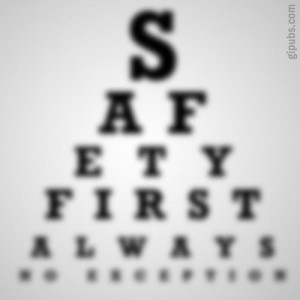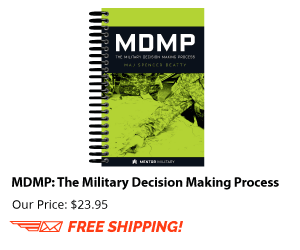Leaders are responsible for both the good and the bad within our area of responsibility or scope of influence. We are also responsible for helping to shape, mentor, and grow the future leaders of this great nation. As part of that responsibility we must be able to recognize the difference between an honest mistake and an unforgivable sin. I will begin by putting rough definitions around these terms.
What is an Honest mistake

One of the best ways to avoid accidents is making sure your rules and safety guidelines are clearly understood.
In my opinion an honest mistake is a mistake that does not result in serious injury or significant property damage. Subordinates learn valuable life and/or leadership lessons from honest mistakes. Others in the unit can learn from them as well. These mistakes can take many forms. Some examples are:
- a minor vehicle accident that results in minor property damage
- a failure to recognize an unsafe act due to inexperience
- failing to check or follow-up on a task to ensure it was completed to standard
Honest mistakes are most often made by inexperienced Soldiers. Once the lesson is learned, they will probably never make the same mistake again.
What is an Unforgivable sin
In contrast, an unforgivable sin cannot be classified as a mistake. These are acts or events in which a Soldier made a conscious or willful decision to do something they knew was wrong or allowed an act or event to occur that was unsafe, illegal, immoral, unethical, and/or resulted in serious injury or significant property damage. Some examples are:
- driving under the influence
- abuse of illegal drugs
- adultery
- stealing
- lying
- gambling with subordinates
There are also times when an individual makes an honest mistake that is of such magnitude that it becomes unrecoverable. If a pilot accidentally pulls the ejection handle in an aircraft he will not recover from this honest mistake. He is leaving that aircraft. Likewise, a leader who fails to safe a weapon and causes a negligent weapons discharge that injures an individual cannot undo the damage. Personnel who leave classified material unattended and later find that the materials have “disappeared” have no definitive way to know who has seen or taken the material.

Anything that causes serious property damage, causes serious personal injury, host nation relations, and/or injury to our national security is an example of an unforgivable sin.
These are mistakes that fall into the unforgivable sin category due to the magnitude of damage. Even if the most well-intentioned and honest Soldier in your unit makes one of these mistakes, there is nothing he can do to reduce the magnitude of the problem. Be wary of the Soldier who tells you:
“I thought you said honest mistakes were okay. We are supposed to learn from them. I learned from this and will not allow it to happen again.”
Do not fall for this twisting of the truth. Individuals who commit unforgivable sins and then use this approach further show their lack of integrity by failing to accept responsibility for their actions or by placing the blame on others. Worse yet, the Soldier in the example above is playing off your own sense of integrity. Handle individuals such as these in the firmest manner possible.
A balanced perspective
So what is the purpose of discussing honest mistakes and unforgivable sins? A well-rounded leader examines every incident from two perspectives: Firstly as a leader charged with enforcing standards and maintaining discipline and secondly as an individual who can empathize with the Soldier. It could have been you in the Soldier’s shoes–you were inexperienced once. You may even be in his position sometime in the future. This is a balancing act and the goal is to find the sweet spot.
You can be a hard and fast leader who operates in a zero defect world. If that is your style, be prepared for subordinates who do not take initiative, do not question orders that may be unclear, are unmotivated, and have little respect for you as a leader.
If you are an empathetic leader who weighs what happened against what can be learned then chances are you will be considered fair and just. This can foster initiative, pride, willingness to seek clarification, high morale, and esprit de corps.
In a nutshell it comes down to a simple leadership principle: treat others as you want to be treated. Help them learn and grow not only from their mistakes but the mistakes of others. When the unit can honestly learn from its mistakes the unit becomes more efficient and the team becomes stronger. I am not suggesting that you lower your standards or that you treat critical errors as minor events. On the contrary, I am encouraging you to deal with individuals that choose to commit unforgivable sins while ensuring the unit grows by sharing lessons learned through honest mistakes and unforgivable sins. Good performers need to see that substandard performers face significant consequences when they choose to make poor decisions and substandard performers need to see the benefits of doing what is right even when no one is looking.














